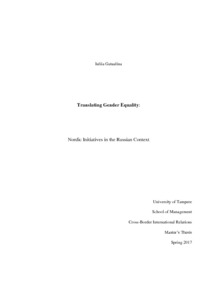Translating gender equality: Nordic initiatives in the Russian context
Gataulina, Iuliia (2017)
Gataulina, Iuliia
2017
Master's Programme in Russian and European Studies
Johtamiskorkeakoulu - Faculty of Management
This publication is copyrighted. You may download, display and print it for Your own personal use. Commercial use is prohibited.
Hyväksymispäivämäärä
2017-06-15
Julkaisun pysyvä osoite on
https://urn.fi/URN:NBN:fi:uta-201706202073
https://urn.fi/URN:NBN:fi:uta-201706202073
Tiivistelmä
The Nordic countries are known for their gender equality agenda and policies. There have been different processes of collaboration on this issue conducted between the Nordic countries and Russia. In today s globalized world, the processes of learning from other countries experiences and transferring best practices in order to solve problems have become more common. However, the concept of universality of provided policy models have been criticized by various researchers since contexts play a great role in adaptation of transferring policies on the ground. Due to the fact that Nordic countries and Russia represent different political, social, and cultural contexts, domestication of the gender equality agenda occurs. Thus, this research, using the postcolonial critique on universality and Alasuutari s concept of domestication, examines how this domestication of the Nordic gender equality norms takes place in the Russian context.
The research, first, presents conceptual and theoretical discussion, starting from the critique of universal understanding of knowledge, and the concept of contextuality. Then, the thesis moves on to discuss the main concepts of the study: policy transfer and domestication of transnational models. This is followed by discussion on the Nordic and Russian gender orders. I have chosen two cases to analyse policy transfer and domestication of Nordic gender models in Russia: the case of collaboration between the Nordic Council of Ministers and North-West Russia and the case of the activist Eve s Ribs project have been studied through means of interview conduction, participant observation and searching documents, websites, etc. for primary data. Case study enables to capture a vivid and rich picture of collaborative processes and draw conclusions on domestication of equality ideas by representative actors. Moreover, as a conclusion, a comparison between two cases presenting different layers of public relations has been made.
This research found that domestication of the gender equality agenda is possible only regionally into current Russia. In general, the importance of local communal contexts and their peculiarities are underlined throughout the research. Moreover, the conclusion about differences in two layers of analysis has been made. Whereas the governmental officials, implementing the Nordic policies, put a big emphasis on the social and labour rights of women and indicate the importance of supporting the issues of motherhood (alike with the historical understanding of gender issues based on biological differences), the feminist activists express more solidarity among themselves sharing almost the same feminist discourse.
The research, first, presents conceptual and theoretical discussion, starting from the critique of universal understanding of knowledge, and the concept of contextuality. Then, the thesis moves on to discuss the main concepts of the study: policy transfer and domestication of transnational models. This is followed by discussion on the Nordic and Russian gender orders. I have chosen two cases to analyse policy transfer and domestication of Nordic gender models in Russia: the case of collaboration between the Nordic Council of Ministers and North-West Russia and the case of the activist Eve s Ribs project have been studied through means of interview conduction, participant observation and searching documents, websites, etc. for primary data. Case study enables to capture a vivid and rich picture of collaborative processes and draw conclusions on domestication of equality ideas by representative actors. Moreover, as a conclusion, a comparison between two cases presenting different layers of public relations has been made.
This research found that domestication of the gender equality agenda is possible only regionally into current Russia. In general, the importance of local communal contexts and their peculiarities are underlined throughout the research. Moreover, the conclusion about differences in two layers of analysis has been made. Whereas the governmental officials, implementing the Nordic policies, put a big emphasis on the social and labour rights of women and indicate the importance of supporting the issues of motherhood (alike with the historical understanding of gender issues based on biological differences), the feminist activists express more solidarity among themselves sharing almost the same feminist discourse.
